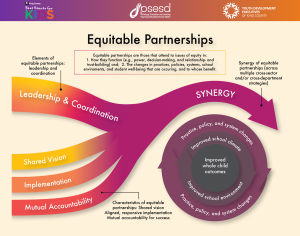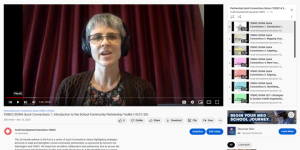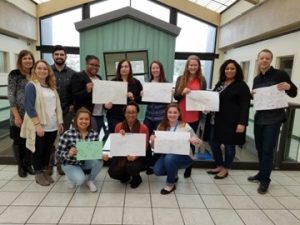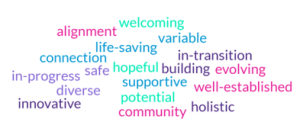By Anne Arias
How would you describe your school and community partnership ecosystem?
Caption: This word cloud includes words used to describe partnership ecosystems in a recent YDEKC-led workshop.
This is the question we’ve been opening several of our recent partnership workshops with, for audiences ranging from School-Based Health Center staff from across Washington State to King County Best Starts for Kids grantees and other youth-serving organizations in King County. We’ve appreciated participants’ commitment to valuing the assets of their partnership ecosystems while recognizing the ways they could grow and change to serve young people even more effectively.
More than seven years after our first version of the School and Community Partnership Toolkit came to life, we continue to grow and learn with and from our partners, too. Over the past year, we have welcomed new opportunities to work in partnership with system leaders to integrate partnership practices and professional development into existing systems.
Here are some of the things we’re learning along the way:
Over the past few years, Best Starts for Kids (BSK) engaged the Strategy, Evaluation and Learning Team from Puget Sound Educational Service District (PSESD) to help answer questions related to partnerships in schools and districts with multiple BSK School Partnership investments, with an emphasis on equitable partnerships. Their on-the-ground local research affirmed many of the strategies and recommendations in YDEKC’s School and Community Partnership Toolkit, while challenging us to be more explicit about the ways we’re naming the dynamics of race and power within our materials and professional development. With permission, we’ve used their research, highlighted in the Final Evaluation Report: Best Starts for Kids: Exploring Equitable School Partnerships, to build new tools and revise existing ones, such as the Human Centered Approach to Partnership Reflection.

Caption: This graphic draws on the PSESD’s Evaluation of Best Starts for Kids Partnership Strategies and illustrates the components of equitable partnerships.
With our colleagues at School’s Out Washington (SOWA), we’ve collaborated to adapt our resources to new contexts. When SOWA launched a “Quick Connections” series early in the pandemic, we embraced this strategy for less-than-60-minute live and recorded learning segments. With our SOWA partners, we’ve been able to shine a light on youth development professionals and their partners who are being creative and collaborative and adapting their practices to meet the needs of youth in their communities.

Caption: YDEKC’s YouTube channel includes a Partnership Quick Connections series with more than 10 videos.
Over the past year, we’ve been collaborating with several different organizations to strengthen partnership practices that are integrated into networks, initiatives, or systems. This summer, for example, we served as a consultant to Seattle Public Schools, collaborating with their School and Community Partnerships Department to design an accessible resource that supports strong, scalable partnerships systems and practices and centers racial equity and the district’s focus on a targeted universal approach with Black male students at the center. While the goal for this playbook was to create a toolkit school administrators would use, we hope that the Partnership Playbook for Schools & Partners will support schools and community partners alike. The project was designed with input from community-based organization focus groups (including some of our member organizations, a school leader advisory cohort, and leaders from the District and City of Seattle.
This fall, we continue our journey to adapt these resources to new audiences and contexts. As it turns out, the concept of partnership ecosystems resonates widely! Our activities this fall include:
- 2022 Partnership Workshop Series, supporting Best Starts for Kids grantees who are building, managing, and strengthening school and community partnerships, funded by the King County Best Starts for Kids levy
- Serving as a Capacity Builder for King County Best Starts for Kids grantees, with a focus on supporting school-community partnerships
- 2022-2023 Partnership Workshop Series, tailored for School-Based Health Center organizations and partners, in collaboration with Public Health – Seattle & King County’s School Based Partnerships Program, funded by the King County Best Starts for Kids levy
When I joined YDEKC as an employee in 2016, we were preparing to launch an “Early Adopters” cohort of community-based organizations to pilot our School and Community Partnership Toolkit. Six years later, we’re excited to be in this new phase of the work and looking forward to what’s next in partnership. As we say in our partnership workshops, we believe that when we center relationships in our work, work in collaboration with others who are dedicated to racial equity, and assess and shift power dynamics, we are influencing change within our own ecosystem, which also influences the system at large. We know this work we do is critical, so that all Black, Indigenous, and youth of color thrive!

Caption: Participants in YDEKC’s first School and Community Partnership Cohort share their school-community partnership ecosystem maps.



